 Pleas from smaller universities to revise proposed changes to the Higher Education Innovation Fund have been ignored, with confirmation on 26 May that 31 institutions are to lose their funding. The changes follow the government’s decision to reform HEIF to focus on the highest-performing universities working with businesses. HEFCE’s statement
Pleas from smaller universities to revise proposed changes to the Higher Education Innovation Fund have been ignored, with confirmation on 26 May that 31 institutions are to lose their funding. The changes follow the government’s decision to reform HEIF to focus on the highest-performing universities working with businesses. HEFCE’s statement
Category / Research news
Global University Rankings ‘startlingly influential’
Times Higher Education today features an article which states while Rankings can provide insights that can help guide policymakers, politicians need to be aware of their inherent limitations following the two-day global forum hosted by the United Nations Educational, Scientific and Cultural Organisation this week.
RCUK welcomes Hargreave’s Review on IP and Growth
 Research Councils UK (RCUK) has welcomed the findings of the Hargreaves Review of Intellectual Property and Growth, published on 18th May.
Research Councils UK (RCUK) has welcomed the findings of the Hargreaves Review of Intellectual Property and Growth, published on 18th May.
The review looks at how the Intellectual Property Framework contributes to growth and identifies barriers; RCUK believes that the implementation of the review’s recommendations will help to remove potential barriers to innovation and, by contributing to the UK’s attractiveness as a base for scientific discovery, will enable UK Research to further contribute to growth, prosperity and wellbeing of the UK.
RCUK welcomes the recommendations that will allow greater mass digitisation which will allow digital preservation of our cultural and scientific output, and enable researchers to use data and text mining to deliver new discoveries in medicine and other areas of research.
Dr Andy Mayers has been formally appointed Patron for Bournemouth and District Samaritans

![]() Dr. Andy Mayers, School of Design, Engineering and Computing, has been formally appointed Patron for Bournemouth & District Samaritans. This represents an opportunity not only to increase and enhance student experience via volunteer placements, but also to benefit the wider community through development of a night-line and crisis centre for the Samaritans based at Bournemouth University. Additionally, Andy will be part of the ‘wellness at work‘ initiative that is being developed within HSC (physical health and stress), counselling services, pastoral care (with Bill Merrington), and mental health (including sleep). In his new role, Andy will be the ‘public face’ of the Samaritans for Bournemouth and surrounding towns.
Dr. Andy Mayers, School of Design, Engineering and Computing, has been formally appointed Patron for Bournemouth & District Samaritans. This represents an opportunity not only to increase and enhance student experience via volunteer placements, but also to benefit the wider community through development of a night-line and crisis centre for the Samaritans based at Bournemouth University. Additionally, Andy will be part of the ‘wellness at work‘ initiative that is being developed within HSC (physical health and stress), counselling services, pastoral care (with Bill Merrington), and mental health (including sleep). In his new role, Andy will be the ‘public face’ of the Samaritans for Bournemouth and surrounding towns.
Dr Zulfiqar Khan is elected as Fellow of the Institution of Mechanical Engineers
 Dr Zulfiqar Khan, School of Design, Engineering and Computing, has achieved the status of Fellow of the Institution of Mechanical Engineers (FIMechE).
Dr Zulfiqar Khan, School of Design, Engineering and Computing, has achieved the status of Fellow of the Institution of Mechanical Engineers (FIMechE).
 The title is the highest elected grade of membership within the IMechE. Fellowship is awarded to members who have demonstrated significant individual responsibility, sustained achievement and exceptional professionalism during their careers.
The title is the highest elected grade of membership within the IMechE. Fellowship is awarded to members who have demonstrated significant individual responsibility, sustained achievement and exceptional professionalism during their careers.
This is an excellent achievement – congratulations Zulfiqar! 😀
Investigating Academic Impact event at LSE on 13 June
The LSE Public Policy Group is running a free one day event on evidencing the impact of research.
Date: Monday 13 June 2011
Time: 10-5pm
Venue: New Academic Building, LSE, London
Academics are increasingly being pressed to provide evidence of impact from their research on the world outside academia. And universities will have to provide evidence of impact as part of the new Research Excellence Framework. But there is confusion about the different definitions of impact that exist amongst funding bodies and research councils, and also about methods of measuring impact.
This one day conference will look at a range of issues surrounding the impact of academic work on government, business, communities and public debate. We will discuss what impact is, how impacts happen and innovative ways that academics can communicate their work. Practical sessions will look at how academic work has impact among policymaking and business communities. Also how academic communication can be improved and how individual academics can easily start to asses their own impact.
PANELS:
Research Impact and the REF
Professor Rick Rylance (Chief Executive, Arts and Humanities Research Council)
David Sweeney (Director of Research, Innovation and Skills, HEFCE)
Professor Paul Wiles (Panel Chair, social work and social policy panel, REF impact pilot)
Current Thinking in Assessing Impact
Professor Patrick Dunleavy (Impact of Social Sciences project, London School of Economics)
Professor Alan Hughes (Centre for Business Research, University of Cambridge)
Tomas Ulrichsen (Public and Corporate Economic Associates)
Innovative Methods for Impact and Engagement
Professor Stephen Curry (blogger, Imperial College London)
Martyn Lawrence (Senior Publisher, Emerald Insight)
Paul Manners (Director, National Coordinating Centre for Public Engagement, UWE)
Mike Peel (Jodrell Bank Centre for Astrophysics / Wikimedia UK)
BREAKOUT SESSIONS:
Academic impact on policy-making
Maria O’Beirne (Analysis and Innovation Directorate, Department for Communities and Local Government)
Jill Rutter (Better Policy Making Programme Director, Institute for Government)
Knowledge transfer and the role of research mediators
Nick Pearce (Director, IPPR)
Professor Judy Sebba (University of Sussex)
Academic impacts on industry and business
James John (Director of Strategy, director of strategy, civil government, HP)
A ‘how to’ guide to measuring your own academic impact
Jane Tinkler (Impact of Social Sciences project, London School of Economics)
Improving academic communication
Professor Patrick Dunleavy (Impact of Social Sciences project, London School of Economics)
Chris Gilson (Managing Editor, British Politics and Policy blog, London School of Economics)
This event is free and open to all but pre-registration is required. For more information phone and email the PPG team on 020 7955 6064 or 020 7955 6731 or by email on impactofsocialsciences@lse.ac.uk|. You can find more information on the Investigating Academic Impact website.
its official – the arts & humanities make a significant contribution to the UK economy
 New research shows that the arts and humanities make a significant contribution to the UK economy in part thanks to researchers being so highly connected with UK businesses. Commissioned by the AHRC and undertaken by the Centre for Business Research (CBR) at the University of Cambridge the report, Hidden Connections: Knowledge exchange between the arts and humanities and the private, public and third sectors, has surveyed over 3500 academics in the Arts and Humanities as well as over 2,500 businesses in all sectors of the UK economy as part of the study.
New research shows that the arts and humanities make a significant contribution to the UK economy in part thanks to researchers being so highly connected with UK businesses. Commissioned by the AHRC and undertaken by the Centre for Business Research (CBR) at the University of Cambridge the report, Hidden Connections: Knowledge exchange between the arts and humanities and the private, public and third sectors, has surveyed over 3500 academics in the Arts and Humanities as well as over 2,500 businesses in all sectors of the UK economy as part of the study.
BU Research Impact event is a success!
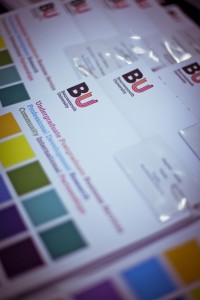 Last Friday BU held an internal Research Impact event to share the success of the excellent research that has been undertaken by BU academics. The focus of the event was on how this research has had an impact outside of academia, for example an impact on society, the economy, quality of life, culture, policy, etc.
Last Friday BU held an internal Research Impact event to share the success of the excellent research that has been undertaken by BU academics. The focus of the event was on how this research has had an impact outside of academia, for example an impact on society, the economy, quality of life, culture, policy, etc.
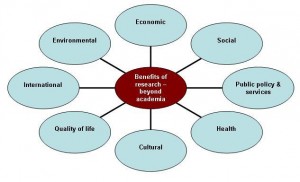
 For the forthcoming REF2014 BU will be required to include a number of research impact case studies as part of the submission. This is a new element to the REF (previously the RAE) and the HE sector has been grappling with the concept of impact for a number of years now.
For the forthcoming REF2014 BU will be required to include a number of research impact case studies as part of the submission. This is a new element to the REF (previously the RAE) and the HE sector has been grappling with the concept of impact for a number of years now.
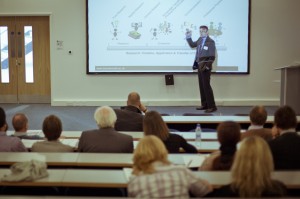
The event, attended by over 75 BU staff, opened with a presentation from Prof Matthew Bennett (Pro Vice Chancellor – Research, Enterprise and Internationalisation) on BU’s future research strategy, planning for the REF, and how to develop and evidence research impact.
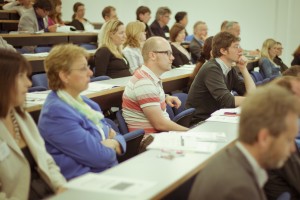 Part of the presentation focused on the BU Research Themes which are currently being identified and defined through academic consultation via the Research Blog. This is still in the early stages but Matthew presented the ten draft themes that are emerging. You can comment on the emerging themes here.
Part of the presentation focused on the BU Research Themes which are currently being identified and defined through academic consultation via the Research Blog. This is still in the early stages but Matthew presented the ten draft themes that are emerging. You can comment on the emerging themes here.
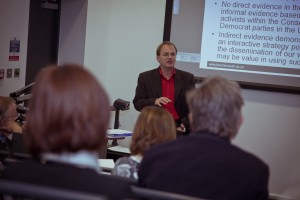
There were 35 impact case studies presented in total with most units of assessment (UOAs) presenting three case studies. At the end of each presentation members of the audience critiqued the case study and offered advice as to how the strengthen and maximise the impact claim.
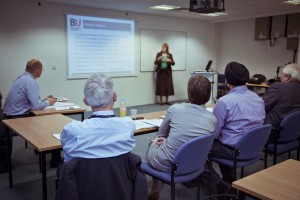 Attendees were encouraged to go to impact case study presentations from different UOAs/Schools to find out about research that is undertaken in different areas of the University. Stronger impact case studies can also be developed with input from different disciplines.
Attendees were encouraged to go to impact case study presentations from different UOAs/Schools to find out about research that is undertaken in different areas of the University. Stronger impact case studies can also be developed with input from different disciplines.
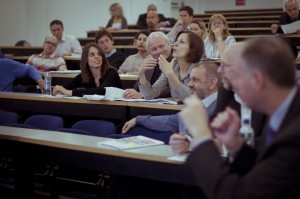 The event was also attended by key staff from Marketing & Communications who will be working with UOA Leaders to develop and enhance impact case studies between now and the REF submission in autumn 2013.
The event was also attended by key staff from Marketing & Communications who will be working with UOA Leaders to develop and enhance impact case studies between now and the REF submission in autumn 2013.
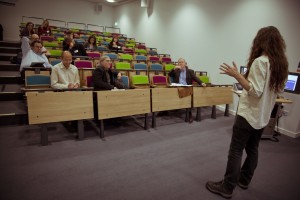 There has been much positive feedback received from attendees and we are considering whether this should now be an annual event, celebrating the success of BU research and its benefit to society.
There has been much positive feedback received from attendees and we are considering whether this should now be an annual event, celebrating the success of BU research and its benefit to society.
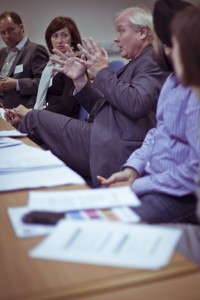 Many thanks to all the presenters and attendees, and everyone who supported the event and made it such a success! 😀
Many thanks to all the presenters and attendees, and everyone who supported the event and made it such a success! 😀
We are now seeking feedback on the impact case studies presented. These are all available on the I-drive (I:\CRKT\Public\RDU\REF\REF event May 2011\impact case study presentations). Please could you email your feedback to Anita Somner in the Research Development Unit by Friday 3 June. Anita will then anonymise and collate the feedback and share it with the UOA Leaders.
For further information on impact see the impact pages on the HEFCE website or our previous BU Research Blog posts on impact.
Eggs-citing new research engine and funding competition launched – CRACK-IT
![]() CRACK-IT®, is a new research engine and funding competition being launched by the NC3Rs this year to connect academic and industrial researchers in solving global scientific challenges associated with animal models in the biosciences – focusing on improving efficiency and translation and minimising reliance on in vivo research.
CRACK-IT®, is a new research engine and funding competition being launched by the NC3Rs this year to connect academic and industrial researchers in solving global scientific challenges associated with animal models in the biosciences – focusing on improving efficiency and translation and minimising reliance on in vivo research.
A number of regional roadshows to launch CRACK-IT® and highlight the range of funding opportunities . A range of industry speakers will discuss the current challenges in pharmaceutical and chemical development and the move towards open innovation and new mechanisms for collaboration. See CRACK-IT® for further details .
Neantherthal Man: not such a different hunter after all
 Scientists supported by NERC have found that our cousins the Neanderthal employed sophisticated hunting strategies similar to the tactics used much later by modern humans. The new findings come from the analysis of subtle chemical variations in reindeer teeth. Read more on this project on the NERC website .
Scientists supported by NERC have found that our cousins the Neanderthal employed sophisticated hunting strategies similar to the tactics used much later by modern humans. The new findings come from the analysis of subtle chemical variations in reindeer teeth. Read more on this project on the NERC website .
Upcoming Missenden Centre workshops – book your place now!

The Missenden Centre still has places available on two excellent workshops in June. The Research Development Unit has some funds available to support academics and research support staff to attend. If you are interested please contact Julie Northam in the first instance.
Successful bidding: second of our day clinics
2nd June
Woburn House, Tavistock Square, London WC1H 9HQ
Tutor: John Wakeford
Bring a draft or previously unsuccessful application for advice on how to turn it into an award-winning form.
http://www.missendencentre.co.uk/s8.htm
Bidding for research funding: pathways to success
15/16 June for academics and
16/17 June for research support staff
With Sarah Andrew, Dean of Applied and Health Sciences, University of Chester
Robert Crawshaw, Faculty of Arts and Social Science, Lancaster University
‘The course was excellent. I think it will probably change my entire approach to writing grant proposals and will most wholeheartedly recommend it to my colleagues. So, once again, many thanks.’ Dr. Miriam V. Dwek, Senior Lecturer in Biochemistry, University of Westminster.
http://www.missendencentre.co.uk/s7.htm
Book your place now!
HEFCE and RCUK work together on open access publishing
 HEFCE and Research Council UK (RCUK) have today committed to work together to make open access to published research a reality.
HEFCE and Research Council UK (RCUK) have today committed to work together to make open access to published research a reality.
Open access publishing turns the traditional publishing route (readers paying subscriptions to publishers) on its head as researchers pay a fee to the publisher to publish their research and in turn the publisher makes the article available free of charge to readers immediately on publication. This enables research findings to be shared with a wider public audience thus increasing the visibility and potential impact/influence of the research findings.
Read the full story here – http://www.hefce.ac.uk/news/hefce/2011/rcuk.htm
BU has recently launched the BU Open Access Publication Fund. For further information read our previous post on the new fund.
Earlier this week SAS launched a short survey on attitudes towards open access publishing. Read more and take part in the survey here.
The excellent HEFCE REF event at BU!
Developing and Assessing Impact for the REF
 Last week BU hosted a HEFCE-supported event for universities in the south of England outlining recent changes in how the quality of research in higher education is assessed.
Last week BU hosted a HEFCE-supported event for universities in the south of England outlining recent changes in how the quality of research in higher education is assessed.
The event, attended by over 150 delegates from 39 institutions, outlined the new Research Excellence Framework (REF) which includes a new assessment element focusing on research impact.
As Chris Taylor, Deputy REF Manager for HEFCE, explained: “REF will provide accountability for public investment in research and demonstrate its benefits.” He continued:
“Impact is defined as any contribution the research makes outside of academia. It is the higher education sector’s opportunity to shout about what it contributes to society.”
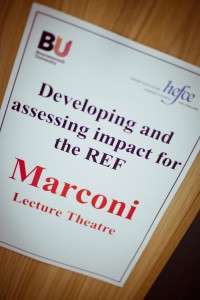 Professor Peter Taylor-Gooby (University of Kent), Professor Roy Harrison (University of Birmingham), Professor James Goodwin (Age UK), Dr Kathryn Monk (Environment Agency Wales) and Dr Mari Williams (RCUK) presented their experiences of assessing impact case studies in the REF pilot exercise. Professor Jim Griffiths (University of Plymouth) presented his experience of identifying and submitting impact case studies to the pilot exercise in the hope that others would learn from his experience.
Professor Peter Taylor-Gooby (University of Kent), Professor Roy Harrison (University of Birmingham), Professor James Goodwin (Age UK), Dr Kathryn Monk (Environment Agency Wales) and Dr Mari Williams (RCUK) presented their experiences of assessing impact case studies in the REF pilot exercise. Professor Jim Griffiths (University of Plymouth) presented his experience of identifying and submitting impact case studies to the pilot exercise in the hope that others would learn from his experience.
Prevalent themes emerging from the pilot included the importance of a demonstrable chain of evidence from impact claim through to outcome, high quality research underpinning the impact claim and fostering the crucial relationship between academic and user.
Professor James Goodwin explained how research can change society for people’s benefit, stessing the importance of “converting research into a message that will influence people’s thinking”. He gave the recent removal of the default retirement age as an example of how this can influence policy.
The event closed with a Q&A session with all speakers, giving delegates the chance to obtain further clarity on the REF that will undoubtedly change the future of higher education research.
Matthew Bennett (BU’s PVC for Research, Enterprise and Internationalisation) said: “There has been sector-wide concern about how impact will be defined, collated and assessed in the REF, and this event provided excellent advice and guidance for academic staff likely to be submitting to the REF and those leading the submissions.”
The deadline for submitting submissions is November 2013 and the assesment will be made in 2014.
We will be adding further posts to the Research Blog focusing on the good practice shared at the event (such as defining impact, what makes a strong impact case study, etc) over the next few weeks.
World Experts meet to determine future direction of soil carbon monitoring and reporting
 A workshop organised by the BBSRC brought together top scientists from around the world to plan the future direction of standards and methodologies in the area of soil carbon monitoring and reporting. This will make a significant contribution to our knowledge of the role of soil in addressing climate change.
A workshop organised by the BBSRC brought together top scientists from around the world to plan the future direction of standards and methodologies in the area of soil carbon monitoring and reporting. This will make a significant contribution to our knowledge of the role of soil in addressing climate change.
Outputs of the workshop will be a series of scientific papers outlining the challenges and opportunities of soil carbon monitoring in the context of biomass production. This will help to inform sustainable management of changing land use, as well as any shift towards biomass crops within agriculture; contribute to the future direction of research in this area; and help to inform policy for sustainability. It is likely that opportunities will emerge from this work to improve the overall sustainability of bioenergy and an improved appreciation of the flux of carbon into and out of the soil will complement our increasing knowledge of the roles of genetics, physiology and agronomic traits of bioenergy crops.
International panel praises quality of UK psychology research
 The ESRC, British Psychological Society (BPS), the Experimental Psychology Society (EPS) and the Association of Heads of Psychology Departments (AHPD) agreed in 2009 to work in partnership to benchmark the quality and impact of research in the UK against international standards.
The ESRC, British Psychological Society (BPS), the Experimental Psychology Society (EPS) and the Association of Heads of Psychology Departments (AHPD) agreed in 2009 to work in partnership to benchmark the quality and impact of research in the UK against international standards.
The Panel’s headline finding is that, overall, the quality of UK psychology research is very high, bettered only by psychology research from the USA and in a substantial number of areas, UK psychology research is unsurpassed anywhere in the world. The Panel’s view is corroborated both by the outcome of the 2008 Research Assessment Exercise and bibliometric analysis.Read more on the ESRC webpage.
Drive knowledge flow, influence, network and get insider information with Knowledge Transfer Networks
 Knowledge Transfer Networks (KTNs) act as a single national network in a specific field, bringing together businesses and academics to stimulate innovation through knowledge transfer. By joining a Technology Strategy Board’s KTN you can help drive the flow of knowledge both within and in-and-out of specific communities and improve your ability to network, keep up to date with the very latest information and news, funding opportunities, policy, regulation and strategy. KTNs exist in many different areas so why not join one today? Aerospace, Aviation and Defence, Biosciences, Creative Industries, Digital, Electronics, Sensors, Photonics, Energy Generation and Supply, Environmental Sustainability, Financial Services, FP7UK, HealthTech and Medicines, ICT, Industrial Biotechnology, Materials
Knowledge Transfer Networks (KTNs) act as a single national network in a specific field, bringing together businesses and academics to stimulate innovation through knowledge transfer. By joining a Technology Strategy Board’s KTN you can help drive the flow of knowledge both within and in-and-out of specific communities and improve your ability to network, keep up to date with the very latest information and news, funding opportunities, policy, regulation and strategy. KTNs exist in many different areas so why not join one today? Aerospace, Aviation and Defence, Biosciences, Creative Industries, Digital, Electronics, Sensors, Photonics, Energy Generation and Supply, Environmental Sustainability, Financial Services, FP7UK, HealthTech and Medicines, ICT, Industrial Biotechnology, Materials
Our jazzy new EU tab!
 Some of you sharp-eyed bloggers may have noticed we have a brand new EU tab. This marks the Research Development Unit’s dedication to increasing the awareness of EU funding and supporting you to maximise networking opportunities. The EU blog will feature essential information including networking events, forthcoming information days, key policy changes, internal workshops and of course calls for proposals.
Some of you sharp-eyed bloggers may have noticed we have a brand new EU tab. This marks the Research Development Unit’s dedication to increasing the awareness of EU funding and supporting you to maximise networking opportunities. The EU blog will feature essential information including networking events, forthcoming information days, key policy changes, internal workshops and of course calls for proposals.
All stories from this tab will feature in our snazzy daily digest email so make sure you’ve signed up so you don’t miss out!

Networking Opportunities at BU conference
 The 4th International Conference on Education for Sustainable Development and Global Citizenship (Global Vision, Local Action), is taking place on the 8th and 9th September at the Executive Business Centre . This conference will provide a great opportunity for staff development and an excellent platform for staff to network and engage with like-minded academics for potential research collaborations.
The 4th International Conference on Education for Sustainable Development and Global Citizenship (Global Vision, Local Action), is taking place on the 8th and 9th September at the Executive Business Centre . This conference will provide a great opportunity for staff development and an excellent platform for staff to network and engage with like-minded academics for potential research collaborations.











 Cybersecurity Learning through Game-Based Mechanisms
Cybersecurity Learning through Game-Based Mechanisms Nepal Study Days 2024
Nepal Study Days 2024 We can help promote your public engagement event or activity
We can help promote your public engagement event or activity Funded Public Engagement Opportunity – ESRC Festival of Social Science 2024 -Deadline for Applications Thursday 16 May
Funded Public Engagement Opportunity – ESRC Festival of Social Science 2024 -Deadline for Applications Thursday 16 May 1 WEEK REMAINING- Postgraduate Research Experience Survey (PRES) 2024
1 WEEK REMAINING- Postgraduate Research Experience Survey (PRES) 2024 MSCA Postdoctoral Fellowships 2024
MSCA Postdoctoral Fellowships 2024 Horizon Europe News – December 2023
Horizon Europe News – December 2023